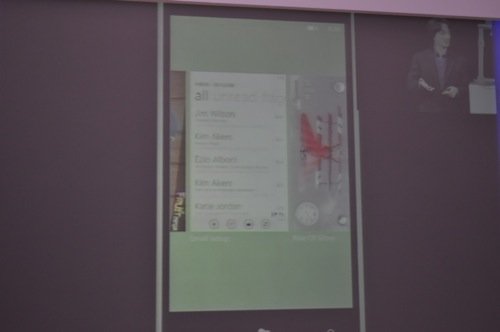Multitasking support for WP7 detailed & updated with more information

The Microsoft keynote at Mobile World Congress definitely didn’t disappoint those of us that have been hungry for more details on the direction of our platform of choice.
One of the main things that Windows Phone 7 has gotten knocked for is the lack of multitasking for third party applications. The big news of the day is that Microsoft has committed to deliver multitasking support for Windows Phone 7 during the 2011 calendar year.
During the keynote, Microsoft’s Joe Belfiore demonstrated how multitasking would work. Part of the multitasking interface is seamless. If you navigate away from an application and come back, the application will not only pick up where it left off, but it will do it quickly and efficiently. Belfiore also demonstrated an early view of the task switcher for Windows Phone. Pressing and holding the back button launches the UI (which looks like a poor man’s version of the WebOS card-based interface). We did not see a demo of killing apps.
One of the best things about multitasking for a lot of people is what this means for third-party music apps like Last.fm or Slacker Radio. During the demo we saw Slacker Radio playing in the background while reading email and otherwise using the phone in a normal manner. Additionally, it appears that third-party music apps can be controlled using the playback controls which appear at the top of the screen when the volume buttons are pressed.
All-in-all, this looks to be a big year for Windows Phone 7. Any thoughts on multitasking for Windows Phone? Is this a key feature for you? Talk it up in the comments section!
Update: Hi all, Dieter Bohn here. Tim has broken it down pretty darn well above based on what Microsoft presented today. On top that that, we have a few more details on how multitasking will work on Windows Phone 7 - join us after the break!
So here's the deal: everybody is using the term "Multitasking" in different ways and so it's essentailly more of a marketing term for "get your apps launched quickly" than "apps run in real time in the background." Apple was derided a bit for not having "true multitasking" with their iOS update - instead they had background services - but now that it's out nobody really seems to mind.
All the latest news, reviews, and guides for Windows and Xbox diehards.
I suspect that it's going to be a similar story once Microsoft unveils the full details on how multitasking on Windows Phone operates. In essence, when you leave an app what it does it very quickly pause and save its state in "deep hibernation." Then when you relaunch it, it is able to grab that information and relaunch very quickly. So you could accuse Microsoft of having "multitasking lite." However apps will be able ot perform certain services in the background - the example of Slacker being able to continue playing music even after you leave the app is a perfect example. This is very similar to what Apple did with iOS multitasking - apps freeze in the background but there is a discrete set of services that they can continue to use when they're not in front.
We also hear that certain apps will be able to periodically 'wake' themselves while in the background to grab small pieces of data. So in a well-written third party app you will still see new infomration when you re-open it. The perfect example is a Twitter app that could grab new tweets from time to time so that when you reopen it after it's been closed for a long time it won't feel so out of date.
So to sum up: Multitasking on Windows Phone 7 looks to be a combination of very fast pause, hibernate, and wake states combined with a set of multitasking services like iOS offers. If that doesn't sound like true multitasking to you, well, we bet that when you actually use it that won't matter - just ask an iOS user how often their version of multitasking gets in the way. iOS offers local notifications, push notifications, task completion (for finishing uploads), saved state, audio, voip, and location. For the vast majority of use cases, that covers most users.
We're sure that Microsoft will clear up exactly which multitasking services apps will be able to take advantage of while in their background hibernation state. So far we know that music can play and apps can periodically grab new information. Hopefully there will be more to come.

Tim is a Former Contributor for Windows Central.
